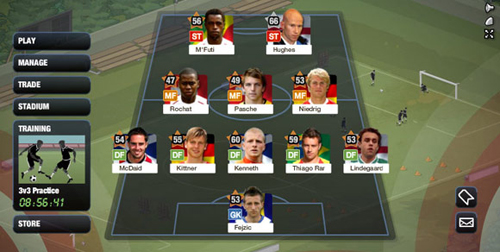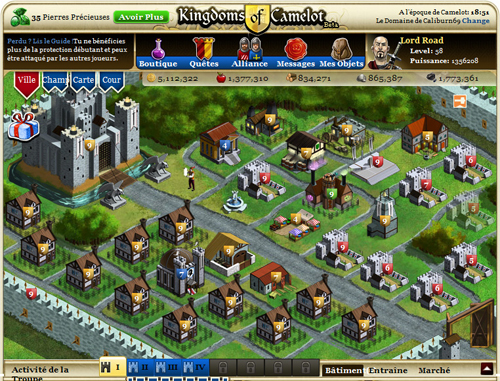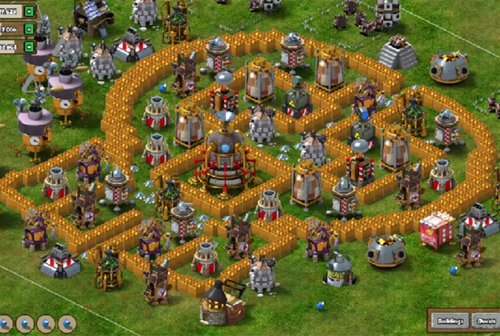业内人士称锁定硬核玩家的社交游戏前途光明
新晋开发商们能否在Facebook游戏的新纪元中获得成功?两名开发商以及一名行业顾给出了一致肯定的答案。
一名行业顾问表示,传统观点认为若想在Facebook上获得真正的成功,则必须具备如Zynga和CrowdStar那般巨大的影响力,这种观点纯属一派胡言,开发商对此表示。实际上,在如今的市场,一款更小、更专业、受众定位更明确的好游戏同样可以取得相当不错的回报。
开发商表示,在过去的一年中,社交游戏这一行已经是风水轮流转,重视传统硬核玩家的游戏开始得势,开发商们也开始创建更有深度、更侧重战略的游戏来吸引他们。例如,美国加州的Kabam公司主要在Facebook上投放“大型多人在线社交游戏”(MMSG),与此同时,旧金山的Casual Collective工作室则致力于开发类似《使命的召唤》这种深受硬核玩家喜爱的Facebook游戏。
这种现象并不让人意外,Facebook的首席技术官布雷特·泰勒(Bret Taylor)在最近的Inside Social Apps大会上,就中小型社交游戏开发商如何在Facebook取得成功这一问题作了报告。
咨询公司Fuzbi LLC的代表大卫·艾德瑞(David Edery)表示:“我们关注的不是吸引了大批主妇用户的《CityVille》和《FrontierVille》等休闲社交游戏,而是发展速度比它们快得多,且规模更小、更具有针对性的游戏。如果你相信数据的话,就会发现当排名51至175位的游戏在去年大幅成长时,排名前五的游戏的用户却在不断流失。”此外,他认为这些成长迅速的游戏在市场推广上都很有针对性。他表示:“这是理所当然的事,如果你开发了一款很棒的足球游戏并在博客上面向球迷进行推广,你有理由相信它的宣传效果和客户印象将比农场游戏好得多,农场游戏吸引的是谁?农民吗?”
他以EA公司目前排名62位的游戏《FIFA Superstars》为例,“根据数据显示,该游戏目前拥有59.4万日活跃用户,这是一个相当不错的数字。任何超过数十万的游戏均可取得良好的回报。”
然而,绝大多数开发商都未发觉精准的游戏定位可以为他们创造更多机会。艾德瑞表示,有不少开发商甚至无法接受免费模式这种运营理念,不愿意把游戏当成一项可持续发展的服务来做,而非一次性的消费体验。
艾德瑞去年曾就Facebook的开发商如何在“小众市场”中获利这一问题发表了自己的观点。换言之,如果一款游戏在Xbox Live上排名163位,这代表每天可能只有五人在玩这款游戏,PSN的情况与此类似。但在Facebook,第163位的排名则可能拥有约5万的日活跃用户人数,这是一个令人侧目的统计数字,意味着一个绝佳的赚钱机会。
他补充表示,“所以我的意思是,如果一款游戏设计无误且采用了正确的营收方式,那么它完全有可能每年创收20万、30万,甚至50万美元。Facebook是唯一一个可以在排名靠后的情况下,仍能获取可观利润的平台。”
已成立五年的开发商Kabam(游戏邦注:原名Watercooler Games)旗下的三款Facebook游戏《Kingdoms of Camelot》、《Dragons of Atlantis》以及《Glory of Rome》表现相当不俗,最早的《Kingdoms of Camelot》于2009年末发布,目前月活跃用户人数约580万。首席产品总监安德鲁·谢帕德(Andrew Sheppard)表示,“它们的盈利能力好比《使命的召唤》、《光晕》以及《星际争霸》等在掌机游戏领域的吸金能力,这也是我们为何看好这个市场机遇的原因所在。”不过,他没有透露Kabam的销售和盈利状况。
游戏邦获悉,Kabam在上个月宣布融资3000万美元开发新游戏,并有可能采取一些收购行动。谢帕德表示,这些新游戏的定位将与前面三款游戏相同,即面向Facebook上的硬核玩家的大型多人在线社交游戏((MMSG)。他希望额外的融资能够提高Kabam发布新游戏的效率,从三四个月发布一款游戏变成一两个月发布一款新游戏。
同时,谢帕德还表示,Kabam的规模在过去一年中扩张了十倍,员工人数已达230人,他仍然希望公司在加州和北京的工作室都能继续保持这种积极的增长势头,他们有意开放更多工作岗位,诚聘喜欢创造硬核游戏体验的有志之士。
他表示,“我们所追求的策略与其他社交游戏公司完全不同,与吸引休闲玩家相比,我们更注重开发吸引硬核游戏玩家的新游戏。MMSG游戏结合了MMO策略类、角色扮演类游戏更有深度、沉浸式的游戏玩法,以及Facebook等社交网站所创造的互动性和社交性等优势。”
休闲社交游戏玩家只有在向朋友请求帮助时才会与他们互动,而MMSG游戏则与此不同,它可以提供与现实世界同步的游戏体验,在由全球数百万玩家构成的游戏世界中,玩家们可以实时与他人合作或对抗,实时聊天也是其特色之一。
谢帕德将Zynga、Playdom、以及PlayFirst等公司称为“第一代社交游戏公司”,并认为它们培训出了第一代Facebook游戏玩家,他们中的许多人此前从未接触过游戏。“然而,部分玩家渴望更深入、更丰富的游戏体验,这一群体基本就是我们的目标受众。”Facebook上玩休闲游戏的人群多为40岁以上的女性,而Kabam的核心用户则大多是25岁以上的男性。
例如在Zynga的休闲游戏中,“玩家只能与Facebook上的好友进行封闭式的互动,获得异步的游戏体验。并且它们的游戏体验时长较为短暂,约为5到15分钟,玩家难以获得更深入的游戏体验。而MMSG的同步游戏设置却可以让成千上万的玩家长时间彼此互动,这一点与《魔兽世界》很相似。”
“讽刺的是,虽然Zynga是公认的社交游戏领袖,但当你认真审视他们的游戏,就会发现他们的社交性其实并不比《魔兽世界》更强。他们的游戏迫使人们利用朋友来让自己在游戏中取得优势,而我们的策略与此完全不同。”
与此同时,成立三年的Casual Collective也瞄准了更为传统的玩家,首席执行官威尔·哈彬(Will Harbin)表示,“创意雷同的农场游戏如此之多,与其和他人分食同一块蛋糕,不如另辟蹊径。所以我们决定在开发Facebook游戏时更加注重传统取向,以吸引对《CityVille》游戏不感兴趣的玩家。”
哈彬认为,他的核心用户是传统的硬核玩家,约有80%是男性、60%—-70%处于20岁至40岁之间。为了迎合这一目标群体,他的团队在过去的几个月中修改了他们最受欢迎的游戏《Backyard Monsters》。他说:“我们让怪兽的形象更酷,减少可爱元素,并增加了一些暴力元素等,改版结果是我们吸引了更多目标用户群体。”他还表示,以后发布新游戏时也会记住这一点。
Casual Collective在Facebook上有两款游戏:《Desktop Defender》和《Backyard Monsters》,正处于内测阶段的第三款游戏《Battle Pirates》将在本月末发布公测版。哈彬表示,“我们在《Battle Pirates》中加载了外形冷峻的舰队、导弹发射器、火箭、枪支、加农炮之类的东西。”
不过他也不肯透露具体的财政数据,仅表示自己对《Backyard Monsters》的表现十分满意。“它的ARPU(每用户平均收益)可能比《CityVille》稍高,但比起《Kingdoms of Camelot》还是稍逊一筹。我所能说的是,这已经完全实现了我们的预期增长目标,我们的日活跃用户已有将近90万人。只要一切按照计划进行,我预计未来数月中这个数字还会攀升至250万左右。除此之外,我们的DAU与MAU比值是30%,我不知道还有其他哪款游戏达到了这种水平。”
他表示,开发商若想在Facebook取得成功,不必挤入前五名甚至前十名。“因为Facebook规模庞大,至少有7亿注册用户,只要月活跃用户超过数百万,你就能够打造一个十分成功的公司。你不必成为Zynga,尽管我敢肯定大家都期待自己能把Zynga挤下王位。开发商还有大量俘获传统玩家的空间,这些玩家习惯在Xbox 360或PS3上玩游戏,但现在他们也希望在手机等更容易接触的平台上获得类似的游戏体验。”
对渴望成功但却发现难以虏获用户的开发商,Fuzbi的艾德瑞也提供了类似的建议。
他认为,“不光是Facebook的病毒式传播渠道已经行不通了,你还得和已获得风险投资支持的大公司,以及那些为了吸引眼球不惜砸下重金的发行商竞争。我建议开发商把注意力集中在未开发的领域,举例来说,如果从未有人开发过出色的潜艇游戏,那么你就可以去开发,然后到所有潜艇发烧友网站宣布你开发了一款很赞的新游戏,并呼吁大家前来体验。与试图打造下一个《CityVille》相比,这条捷径更靠谱。”
他最后表示:“如果你认为自己能创造下一个奇迹,那随你便吧。但千万要清楚你将和财力雄厚的大公司竞争,务必作好打一场硬战的准备。”(本文为游戏邦/gamerboom.com编译,转载请注明来源:游戏邦)
Gaming The New Era Of Facebook
[Can new developers find success in the post-notifications era of Facebook? We've got three resounding affirmatives from two developers and a consultant, and we explore their paths in this Gamasutra feature.]
While conventional wisdom says one needs the sort of massive hits that Zynga and CrowdStar generate to be really successful on Facebook, that’s “total nonsense,” says one consultant — and developers concur.Rather, in today’s market, a great game that targets a smaller, dedicated, niche audience can bring in decent money.
Indeed, developers say, within the last year, the pendulum has begun swinging away from the so-called “soccer moms” — who gravitate towards casual games — back to the more traditional core gamer. And savvy small-to-mid-sized developers are creating the sort of deeper, more strategic games that appeal to them.
For instance, the Facebook portfolio at Redwood Shores, CA-based Kabam consists mainly of what the company is calling “massively multiplayer social games,” while San Francisco-based Casual Collective is creating Facebook games for the sort of hardcore gamers who enjoy a good Call of Duty match.
None of this surprises the folks at Facebook who are recognizing the phenomenon — and, in fact, Facebook CTO Bret Taylor reported on how small-to-midsized social game developers can be successful on Facebook at the recent Inside Social Apps conference.
According to David Edery, principal of consulting firm Fuzbi LLC, “What we’re seeing is the smaller, more targeted games growing considerably faster than the ‘big mommas’ that appeal to the large, general audiences, like CityVille and FrontierVille. If you believe the statistics, the top five games seem to be losing users while the games ranked 51 to 175 are growing substantially over last year.”
Especially, he says, the targeted games that do a good job of promoting themselves in communities that would be specifically interested in the content. “It stands to reason that if you make a terrific soccer game and you advertise it in blogs for soccer fans, you better damn well believe you’re going to have a better pass-through and better retention than, say, a FarmVille that appeals to — who, farmers?”
He cites EA Sports’ FIFA Superstars — currently ranked #62 — which, he says, “is getting 594,000 daily active users, according to AppData, which is a pretty good number. With anything over a few hundred thousand, you can make some really significant money.”
But the majority of Facebook developers don’t understand the opportunities available to them by narrowly targeting their games, Edery says. Many of them can’t even get their heads around the concept of free-to-play games, he adds. “That’s still very hard for most developers to accept — the idea of giving a game away for free, treating it as a service, and trying to make money over time, not immediately.”
Edery spoke last year about how Facebook developers can make money “at the lowest reaches of popularity.”
In other words, he says, if a game is ranked #163 on Xbox Live, for example, “you are hosed. It means that maybe five people a day are playing you. Same with PSN. But, on Facebook, #163 might have a daily average user level (DAU) of 50,000, which means you have a good chance of making money. That’s an astonishing statistic.
“So what I’m saying is that if that game is designed correctly, if it is monetized correctly, it can make $200,000, $300,000, even $500,000 a year. That’s totally feasible. Facebook is one of the only ecosystems where you can be that far down on the chart, and still be making a good profit.”
At Kabam (formerly Watercooler Games), the five-year-old developer’s three Facebook games — Kingdoms of Camelot, Dragons of Atlantis, and Glory of Rome — are doing considerably better than that. Its oldest game — Kingdoms of Camelot, launched in late 2009 — currently has a monthly average user (MAU) level of roughly 5.8 million.
“That’s in the realm of sales for blockbuster console titles such as Call of Duty: Black Ops, Halo Reach, and Starcraft,” says Andrew Sheppard, chief product officer. “That’s why we’re so bullish on this market opportunity.”
He would not, however, reveal figures on Kabam’s sales or profits.
Last month, Kabam announced that it had raised $30 million in a third round of funding to develop new games — and maybe make a few acquisitions. Those new games, says Sheppard, will all be in the same realm as its previous three — massively multiplayer social games (MMSGs) for hardcore gamers who play on Facebook.
Sheppard expects the additional funding will enable Kabam to increase the frequency of its game releases — from one every three to four months to one every one or two months.
And, he says, even though Kabam has grown 10 times larger over the past 12 months — to a staff of 230 — he expects the aggressive growth to continue both in California and in their Beijing studio. “People who are passionate about building core game playing experiences should know that we have plenty of open roles.”
“We’ve pursued a distinctly different strategy than other social game companies,” he says. “Rather than target casual players, we are focused on creating a new segment of games that appeal to a more core gamer demographic. MMSGs combine the deep, immersive gameplay found in MMO strategy and role-playing games with the social connectivity and interaction provided by social platforms like Facebook.”
Unlike casual social games — where interactions only occur out of game when players request assistance from friends — MMSGs provide synchronous gameplay, adds Sheppard, “where people play with and against other players in real time in persistent game worlds inhabited by millions globally. They also feature real-time chat.”
Sheppard believes companies like Zynga, Playdom, and PlayFirst — which he refers to as “the first generation of social game companies” — trained a whole new generation of gamers on Facebook, many of whom had never touched a game before, in what has become known as a social gaming convention.
“But that audience of casual gamers is thirsting for deeper, richer gameplay experiences,” he adds, “and that’s basically the audience we’re targeting.” He describes Kabam’s core demographic as being mostly 25-plus males compared to the 40-plus females who play Facebook’s casual games.
Those casual games — like the ones created by Zynga — are “very much asynchronous experiences that are gated with just your network of friends on Facebook … and they are designed for short, bursty sessions of gameplay — perhaps five to 15 minutes — that is rather shallow and not that deep,” says Sheppard.
“Our MMSGs feature synchronous gameplay with tens of thousands of users actively participating with one another in sessions that are hours long, very similar to those of World of Warcraft.
“What is ironic is that Zynga is referred to as the leader of social games, but when you really look at their games, they aren’t any more social than WoW. In fact, they are actually less social; their games force you to use your friends to gain advantage in the game,” he adds. “That’s not our approach at all.”
Meanwhile, three-year-old Casual Collective, too, is taking aim at the more traditional gamer “instead of going after the same piece of the pie that others are after,” says CEO Will Harbin. “I mean, there are so many FarmVille rip-offs — or, at least, games with similar mechanics — that we decided to take a more traditional approach to game development on Facebook. We’re going after the user who CityVille really doesn’t appeal to.”
Harbin believes his core audience is the traditional hardcore gamer — about 80 percent male and, of those, 60 to 70 percent in the 20 to 40-year-old age range. In order to cater to that demographic, his team has repositioned its most popular game, Backyard Monsters, in the past few months, “making the monsters more cool-looking and less fluffy and cute, adding a bit more violence, and so on,” he says. “The result has been higher user numbers for the audience we’re after.” He says he’ll keep that in mind as new games are released.
Casual Collective has two games on Facebook — Desktop Defender and Backyard Monsters — with its third, Battle Pirates, currently in alpha but poised to launch a public beta later this month.
“We’re loading Battle Pirates up with cool-looking fleets of ships, missile launchers, rockets, guns, ripper cannons, things like that,” he reveals.
While Harbin, too, chose not to reveal actual dollar figures, he says he is very pleased with how Backyard Monsters is doing. “It’s probably making more [average revenue per user] than CityVille but less than Kingdoms of Camelot.
“What I can say is that it’s been meeting all of our growth targets; we’re close to about 900,000 daily active users. I expect that it will peak at around 2.5 million in another few months as long as everything continues to go as planned. In addition, we have close to a 30 percent ratio of DAU to MAU; I don’t know of any game at that scale that has anywhere close to that engagement.”
The bottom line, says Harbin, is that a developer doesn’t have to be in the top five or even the top 10 to be a success on Facebook.
“Because Facebook is huge — with at least 700 million registered users — you can build a very successful company with just a few million monthly active users,” he explains. “You don’t have to be a Zynga, even though I’m sure everyone wants to be the one to knock them out of the pole position. There’s a lot of open space for developers to capture the more traditional gamers — users who are used to playing Xbox 360 or PS3 but now want to have a similar experience in a mobile, more accessible environment.”
Fuzbi’s Edery shares very similar advice with developers anxious to succeed on Facebook but who are finding it’s not as easy anymore to get the attention of user.
“Not only have Facebook’s viral channels been crippled, but you are competing against big venture-funded companies, as well as publishers, that are spending millions upon millions on advertising to suck up the eyeballs,” he says.
“What I recommend is focusing on an under-served niche,” he explains. “If no one else, for example, has a great submarine game, that’s what you need to make. Then go to all the submarine fan sites and announce that you’ve got a great new game and to come check it out. That’s a much easier path than trying to build the next CityVille that will appeal to 100 million users.
“Hey, if you think you can create the next mega-hit, knock yourself out!” he says. “But just understand that you’re competing with big companies with lots of money to spend. Just recognize that you’re picking a big fight!”(source:gamasutra)










































 闽公网安备35020302001549号
闽公网安备35020302001549号